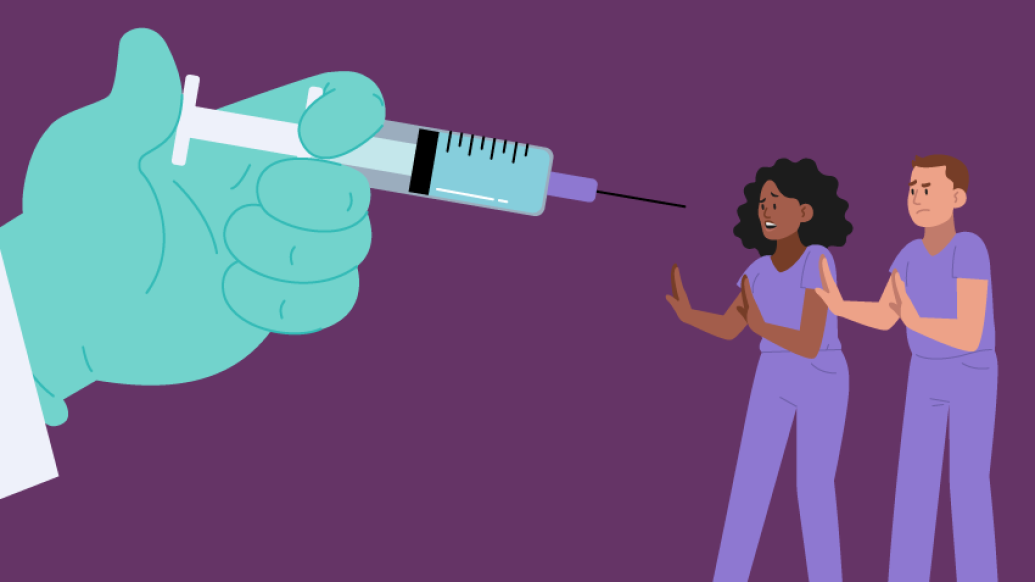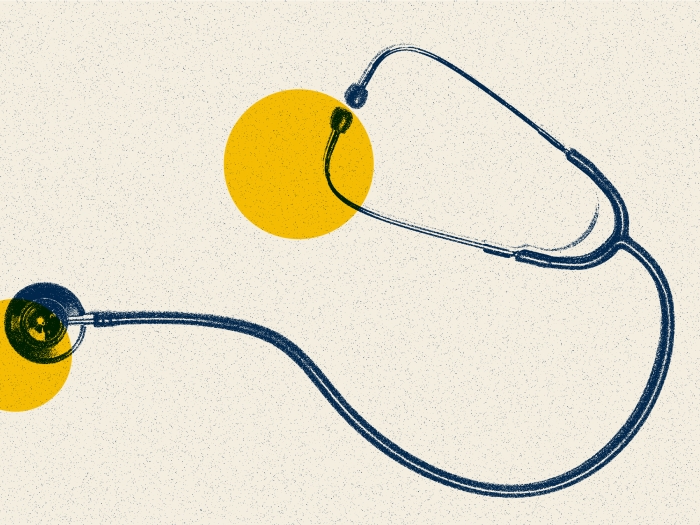Though most healthcare personnel planned to be vaccinated, some were more likely to be reluctant.
9:37 AM
Author |

When the new vaccines for COVID-19 were authorized in late 2020, healthcare workers everywhere, weary from a year of devastating patient losses, were first in line to receive the vaccine.
Yet, not everyone working in a healthcare setting jumped at the chance to be vaccinated. Researchers from Michigan Medicine took a closer look at who was signing up to get a COVID-19 vaccine first—and who was deciding to wait.
"Healthcare workers include people from all walks of life, so we are an early window into what vaccine acceptance may look like in communities more broadly," says Michelle Moniz, M.D., M.Sc., of the Michigan Medicine Department of Obstetrics and Gynecology.
The choice to be vaccinated or not can have broad implications within the arena of patient care. People often look to healthcare workers for information about vaccination and a nurse, physician, respiratory therapist, hospitality staff member, or unit clerk's risk of acquiring an infectious disease also affects patient safety.
Like Podcasts? Add the Michigan Medicine News Break on iTunes, Google Podcast or anywhere you listen to podcasts.
The research team analyzed responses to a survey of 11,387 employees of Michigan Medicine, including clinical and non-clinical staff fielded in February 2021.
Overall, 79.8% of respondents said they had obtained or were scheduled to receive the COVID-19 vaccine or were planning to as soon as possible. The remaining were split between those who said they would not get it now but might in the future and those who said they would never get the vaccine.
"I was pleased to see that a large proportion of healthcare personnel were accepting of vaccination," says Moniz. "The proportion declining or deferring vaccination was smaller, but important - a small percentage of a LARGE number of healthcare workers is still a large number. It is critical to better understand what is driving people's perceptions and decision-making about the COVID-19 vaccine."
Physicians, nurse practitioners, midwives, physician assistants, and trainees were significantly more likely than nurses to get vaccinated, while other clinical staff and all other staff were less likely. Personal prior infection with COVID-19, female gender, non-Hispanic/Black/multiracial ethnicity, and younger age were significantly associated with decreased vaccination intentions.
Some reasons for hesitancy suggested by the survey responses include:
-
Discomfort at the speed at which the vaccine was developed
-
Distrust of government
-
Insufficient data on the vaccine's safety or effectiveness or long-term effects
-
Disbelief that the vaccine would protect them
-
Concern about side effects
"Many people expressed general concerns about 'unknowns' and a need for more information to make a decision. Free text responses suggested that some folks have a preference for inaction, rather than vaccination, in the face of unknowns about the vaccine," says Moniz. "This group is might be open to vaccination with high quality counseling."
Interestingly, one in five people reported at least one concern, but said they got the vaccine or planned to anyway.
"To me, this suggests that vaccine acceptance and hesitancy are on a spectrum, and there is immense hope that compassionate, data-informed counseling and shared decision-making may help us enhance vaccination rates."
The team stresses the need to avoid perpetuating an "us vs. them" mindset and to approach the decision to be vaccinated with empathy.
"We need to first validate people's concerns - there are a lot of unknowns, and it is ok and rational to feel concerned," says Moniz. "Second, we need to avoid eliciting resistance, defensiveness, and argument. One way to do this is to reframe messaging to be less about 'you must get vaccinated' and more about acting to protect loved ones and the community."
This study also included U-M researchers Molly Stout, M.D.; Courtney Townsel, M.D.; Abram L. Wagner, Ph.D.; Brian J. Zikmund-Fisher, Ph.D.; Sarah Hawley, Ph.D., Charley Jiang, MS and Kirsten Bonawitz.
Paper Cited: "COVID-19 Vaccine Acceptance Among Healthcare Workers in a United States Medical Center" Preprint. DOI: 10.1101/2021.04.29.21256186

Explore a variety of healthcare news & stories by visiting the Health Lab home page for more articles.

Department of Communication at Michigan Medicine
Want top health & research news weekly? Sign up for Health Lab’s newsletters today!





